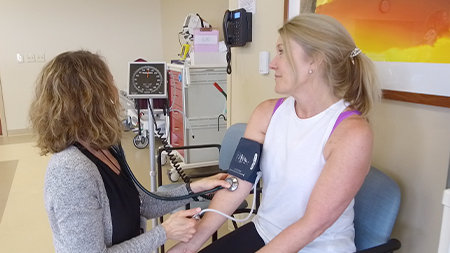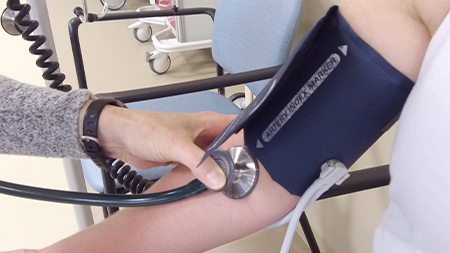Preparing to Fight a “Silent Killer”
Researchers are working to find a device-related therapy for high blood pressure.
Medtronic: Preparing to Fight a “Silent Killer”
Medtronic researchers are working to fight a “silent killer.”
To call high blood pressure “insidious” only scratches at the surface of its deadly impact. It’s a factor in up to half a million deaths every year in the United States alone. It’s often referred to as the “silent killer” because millions of people don’t know they have it. And even those who do know are often unable to control it.
“Intervention is needed now,” said then-acting United States Surgeon General Dr. Jerome Adams in a 2020 Call to Action to fight high blood pressure (also known as hypertension). Dr. Adams advocated making hypertension control a national priority.
Medtronic is aiming to help.
“We are absolutely committed to finding a safe and effective, device-related approach to help fight high blood pressure,” said Jeffrey Popma, M.D., vice president and chief medical officer of the coronary, renal denervation and structural heart businesses at Medtronic. “There’s clearly a clinical need for a technology that goes beyond what’s currently available and addresses unmet clinical needs.”
The health risks associated with hypertension are plentiful. High blood pressure is a major contributor to heart disease and stroke, the first and fifth leading causes of death in the United States. Data show that decreases in blood pressure can make a difference; in one study of more than 600,000 patients, a 10-point reduction led to a 20 percent reduction in coronary heart disease events and a 27 percent reduction in stroke.
An estimated 1 in 2 American adults suffer from hypertension and have been advised by their doctor to make lifestyle changes and/or take high blood pressure medication. But approximately 3 in 4 patients do not have their blood pressure under control.
The issue is often non-adherence – many patients simply cannot or do not make the necessary lifestyle changes or adhere to their medication regimen.
“High blood pressure often comes on gradually and has no outward symptoms,” said Doug Hettrick, Ph.D., senior director of medical affairs at Medtronic. “Patients feel fine. So when they start taking medications, which often have side effects, they may actually feel worse. That negative experience can make it very difficult for people to keep taking their prescribed medications.”
The Surgeon General’s Call to Action identified a wide variety of other “significant barriers” to adherence, such as inadequate health insurance, limited access to healthcare, low levels of health literacy, complex medical management needs, and mental health challenges. Even though the prevalence of high blood pressure has remained unchanged over the last decade, progress in controlling it has “stalled,” according to the Surgeon General.
“Something has to be done,” Popma said. “Our vision is that Medtronic can contribute, by developing a procedure to offer physicians and patients another potential option in the treatment of hypertension.”
Medtronic has devoted years of research and development to studying the nerves that lead to and from the kidneys, and how a minimally invasive device might help some patients who have high blood pressure. The work is ongoing as the device is still investigational in some countries including the United States. “We’re confident we can succeed,” Hettrick said. “And if we do, we may be able to improve life for a lot of people who suffer from hypertension today. Ultimately that’s our Mission and that’s what drives us to continue our research.”



